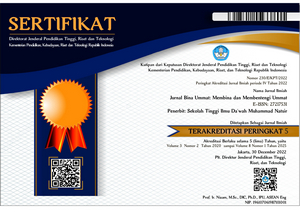P PERAN PEMUDA DALAM DAKWAH MENYONGSONG ERA INDONESIA EMAS 2045
DOI:
https://doi.org/10.38214/jurnalbinaummatstidnatsir.v7i2.297Abstract
Abstract
This research aims to analyze the role of youth in da'wah activities in the context of welcoming the Golden Indonesian Era 2045, an important phase in which Indonesia is expected to reach the peak of progress and prosperity. Using a qualitative approach, this research explores how young people prepare themselves and take an active part in spreading Islamic teachings that are relevant to the challenges of the times. Through in-depth interviews and participant observation, this research reveals that young people who preach are unique in adapting religious messages that are not only informative but also inspirational and accommodate contemporary aspects such as the use of social media, interfaith dialogue, and social activities. The research results show that youth have a strategic role in forming more moderate, inclusive and progressive religious perceptions and practices. It was also found that structural support from religious institutions and the government, such as facilitating activities, leadership training, and providing digital platforms, is very necessary to maximize the potential of youth da'wah. This research proposes recommendations for strengthening cross-sectoral cooperation in developing youth missionary capacity, as well as deeper and more applicable integration of religious education. It is hoped that these findings can become a reference for policy makers in designing da'wah strategies that are effective and responsive to the needs of the younger generation, in line with the aspirations of a Golden Indonesia 2045.
Keywords: Da'wah, Gold 2045, Role, Youth.
Abstrak
Penelitian ini bertujuan untuk menganalisis peran pemuda dalam kegiatan dakwah dalam konteks menyongsong Era Indonesia Emas 2045, sebuah fase penting dimana Indonesia diharapkan mencapai puncak kemajuan dan kesejahteraan. Dengan menggunakan pendekatan kualitatif, penelitian ini mengeksplorasi bagaimana pemuda mempersiapkan diri dan mengambil bagian aktif dalam menyebarkan ajaran Islam yang relevan dengan tantangan zaman. Melalui wawancara mendalam dan observasi partisipatif, penelitian ini mengungkap bahwa pemuda dakwah memiliki keunikan dalam mengadaptasi pesan-pesan keagamaan yang tidak hanya informatif tetapi juga inspiratif dan mengakomodasi aspek-aspek kekinian seperti penggunaan media sosial, dialog antariman, serta kegiatan sosial kemasyarakatan. Hasil penelitian menunjukkan bahwa pemuda memiliki peran strategis dalam membentuk persepsi dan praktik keagamaan yang lebih moderat, inklusif, dan progresif. Ditemukan juga bahwa dukungan struktural dari lembaga keagamaan dan pemerintah, seperti fasilitasi kegiatan, pelatihan kepemimpinan, dan penyediaan platform digital, sangat diperlukan untuk memaksimalkan potensi dakwah pemuda. Penelitian ini mengajukan rekomendasi untuk penguatan kerja sama lintas sektoral dalam pengembangan kapasitas dakwah pemuda, serta integrasi pendidikan keagamaan yang lebih mendalam dan aplikatif. Temuan ini diharapkan dapat menjadi referensi bagi pembuat kebijakan dalam merancang strategi dakwah yang efektif dan responsif terhadap kebutuhan generasi muda, sejalan dengan aspirasi Indonesia Emas 2045.
Kata Kunci: Dakwah, Emas 2045, Peran, Pemuda.
Published
Versions
- 2024-12-31 (2)
- 2024-12-31 (1)
Issue
Section
This work is licensed under a Lisensi Creative Commons Atribusi 4.0 Internasional.
Authors who publish with this journal agree to the following terms:
- Authors retain copyright and grant the journal right of first publication with the work simultaneously licensed under a Creative Commons Attribution License that allows others to share the work with an acknowledgment of the work's authorship and initial publication in this journal.
- Authors are able to enter into separate, additional contractual arrangements for the non-exclusive distribution of the journal's published version of the work (e.g., post it to an institutional repository or publish it in a book), with an acknowledgment of its initial publication in this journal.
- Authors are permitted and encouraged to post their work online (e.g., in institutional repositories or on their website) prior to and during the submission process, as it can lead to productive exchanges, as well as earlier and greater citation of published work (See The Effect of Open Access).




